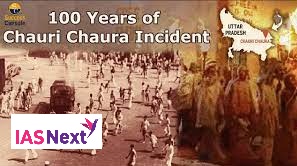CURRENT AFFAIRS
Get the most updated and recent current affair content on Padhaikaro.com
100 Years for ‘Chauri Chaura’ incident
- IAS NEXT, Lucknow
- 08, Feb 2022

Reference News:-
Recently, the Prime Minister paid tribute to the heroes of freedom struggle on completion of the hundred years of Chauri Chaura incident.
What is strong>Chauri Chaura incident?
- The incident (4th February, 1922) occurred at Chauri Chaura in the Gorakhpur district of the United Province, (modern Uttar Pradesh) in British India.
- During this incident, a large group of protesters, participating in the Non-cooperation movement, clashed with police, who opened fire.
- The demonstrators attacked and set fire to a police station in retaliation, killing all of its occupants.
- In response to this, Mahatma Gandhi, who was strictly against violence, halted the Non-cooperation Movement on the national level on 12 February 1922, as a direct result of this incident.
Background:
On 1th August, 1920, Gandhiji had launched the Non-Cooperation Movement against the government.
- It involved using swadeshi and boycott of foreign goods, especially machine made cloth, and legal, educational and administrative institutions, “refusing to assist a ruler who misrules”.
Reaction by Mahatma Gandhi and other leaders:
He condemned the crime of the policemen’s killing.
- A Chauri Chaura Support Fund was set up to demonstrate “genuine sympathy” and seek atonement.
- Gandhi bent the Congress Working Committee to his will, and on 12th February, 1922, the satyagraha (movement) was formally suspended.
Jawaharlal Nehru and other leaders leading the Non-Cooperation movement were shocked that Gandhiji had stopped the struggle when the civil resistance had consolidated their position in the freedom movement.
- Other leaders like Motilal Nehru and CR Das recorded their dismay at Gandhi’s decision and decided to establish the Swaraj Party.
The disillusionment resulting from the suspension of the Non-Cooperation Movement nudged many of the younger Indian nationalists towards the conclusion that India would not be able to throw off colonial rule through non-violence.